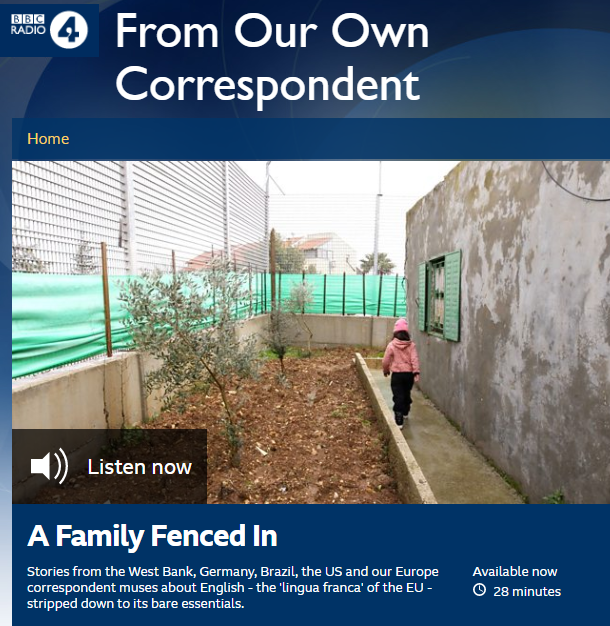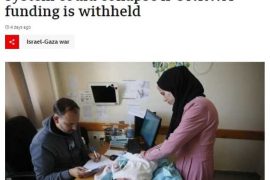Although the BBC was not among them, numerous media outlets reported last week that Hamas is building a new buffer zone along the Gaza Strip’s border with Egypt.
“The Hamas interior ministry has begun to prepare a buffer zone between the Gaza Strip and its border with Egypt. Websites associated with the Hamas posted on Wednesday photographs of bulldozers clearing ground dozens of meters in width along the border.
The ministry stated that the works were intended to bolster security and strengthen the organization’s control along the border. It also said a 12-kilometer patrol road with guard posts, lighting and cameras along it will be paved along the border.
Gaza security forces chief Tawfiq Abu Naim said the project was agreed upon during the last visit by a Hamas delegation to Egypt. The buffer zone will be 100 meters wide (approx. 320 feet), stretching into the Palestinian side of the border, he said. It will be a closed military zone and will help monitor the border and prevent infiltration and smuggling.
“The message to the Egyptian side is a calming one: Egyptian national security is part of Palestinian national security, and we will not let the peace along the southern border be disturbed,” Abu Naim said.
Sources in Gaza told Haaretz that the works will force a lot of families out of their homes. Hamas will have to either pay these families compensation or find them alternative housing.”
That recent visit by a Hamas delegation to Egypt also appears to have germinated collaboration between Egypt, Hamas and Mohammed Dahlan, as Khaled Abu Toameh explains:
“Last month, Hamas leaders traveled to Cairo for talks with Egyptian intelligence officials and representatives of Dahlan, on ways of ending the “humanitarian crisis” in the Gaza Strip. It was the first meeting of its kind between Dahlan’s men and Hamas leaders.
Mahmoud Zahar, a senior Hamas official, disclosed that the two sides reached “understandings” over a number of issues, including the reopening of the Rafah crossing between Egypt and Gaza, and allowing entry of medicine and fuel for the power plants in the Gaza Strip. […]
The unexpected rapprochement between Dahlan and Hamas has already resulted in the return of some of Dahlan’s loyalists to the Gaza Strip. Now, everyone is waiting to see if and when Dahlan himself will be permitted to return to his home in the Gaza Strip.
Sources in the Gaza Strip believe that the countdown for Dahlan’s return has begun. The sources also believe that he may be entrusted with serving as “prime minister” of a new government, while Hamas remains in charge of overall security in the Gaza Strip.”
If that is indeed the case, then Mahmoud Abbas’ recent steps designed to pressure Hamas would appear to have backfired, as Ha’aretz points out:
“Dahlan’s associates have leaked information to the Arabic-language media regarding much bigger plans. Dahlan, it is said, is about to be appointed the new prime minister of the Hamas-ruled Gaza Strip, with Hamas’ consent. […]
But Israeli defense officials were skeptical about the media report. It appears that things haven’t been finalized. Dahlan is due to meet with Hamas officials shortly. […]
The Gaza initiative of Dahlan, who has deep ties with Egyptian intelligence, indicates that he, like Hamas and Egypt, also sees that Abbas is in a position of weakness. Abbas’ recent meetings with envoys for Donald Trump ended in disappointment. The extent of the U.S. president’s determination to jump-start the peace process remains to be seen, and the PA has been suffering worsening economic problems of its own amid dwindling contributions from the Gulf states.”
As has been noted here on many occasions, the topic of internal Palestinian politics in general is one that has long been under-reported by the BBC and the simmering rivalry between Abbas and Dahlan has been serially ignored. As this story develops – and despite the fact that the BBC is one of the few media organisations to have a bureau in Gaza – audiences once again lack the background information that would enable its understanding.
Related Articles:
BBC bows out of coverage of 10 years of Hamas rule in Gaza
BBC’s Knell omits back stories in portrayal of PA succession
BBC News continues to under-report internal Palestinian politics




